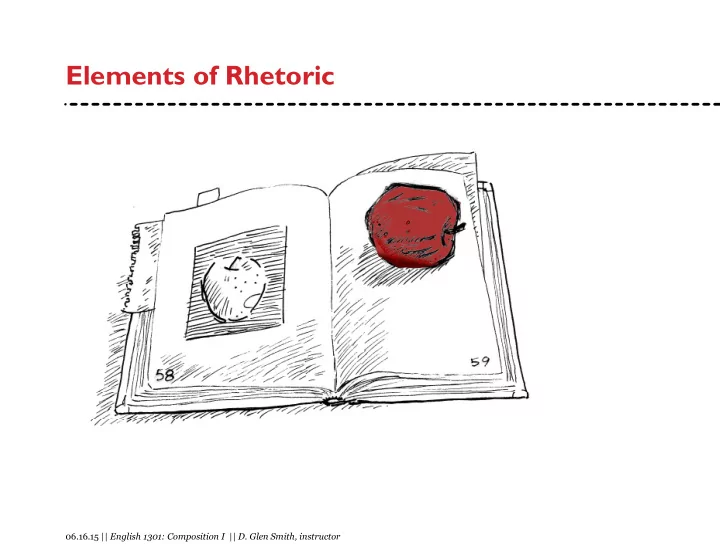

Elements of Rhetoric 06.16.15 || English 1301: Composition I || D. Glen Smith, instructor
introduction Rhetoric —is the art of using language to communicate eff ectively and has been a major part of Western education since the Ancient Greeks. • The philosopher Aristotle is attributed with devising most of these approaches to persuasive and argumentative writing which are still in use today. 2 06.16.15 || English 1301: Composition I || D. Glen Smith, instructor
Appeals in Writing Three Types of Appeals Exist These are rhetorical devices used to enhance observations in research papers: A. logos— (rational) B. pathos— (emotional ) C. ethos— (ethical ) All three of these appeals can be merged into one paper; the longer the work, the greater the necessity for multiple intentions. Likewise, just as one essay can fulfi ll multiple purposes, one essay can use multiple appeals; the purpose of the work controls the type of appeal in use. 3 06.16.15 || English 1301: Composition I || D. Glen Smith, instructor
Appeals in Writing: Logos Logos (rational) • Using a rational appeal requires a burden of proof, or claim . Academic writing requires evidence to back up observations. • A claim is your defense; evidence based on facts, truth, data, statistics. Furthermore, rational appeals utilize fi ve diff erent types of claims . 1. factual 2. value 3. moral 4. causal 5. deliberative 4 06.16.15 || English 1301: Composition I || D. Glen Smith, instructor
Five Types of Claims 1. factual claim: declarative sentence that asserts something: • current reality: Austin is the capital of Texas. • future condition: The US plans to colonize Mars by 2030. • past event: Vikings discovered the New World hundreds of years before Columbus. 5 06.16.15 || English 1301: Composition I || D. Glen Smith, instructor
Five Types of Claims 2. value claim: opinion based declarative promoting personal feelings or tastes, detailing preference between two objects, people, situations. Ulysses is James Joyce strongest, and most complex, novel. 6 06.16.15 || English 1301: Composition I || D. Glen Smith, instructor
Five Types of Claims 3. a moral claim is made on the basis of a prescribed code of values (not necessarily religious): Despite the school board’s intentions, teaching creationism in a high school science class does not off er a well-rounded education. 7 06.16.15 || English 1301: Composition I || D. Glen Smith, instructor
Five Types of Claims 4. causal claims : asserts and defi nes causes for an event or situation: Slavery was only one cause of the American Civil War. 8 06.16.15 || English 1301: Composition I || D. Glen Smith, instructor
Five Types of Claims 5. deliberative claim : a declarative sentence which asserts something should or should not be done. Capital punishment is a necessary deterrent to crime and should continue as a part of Texas’ legal process. 9 06.16.15 || English 1301: Composition I || D. Glen Smith, instructor
Appeals in Writing: Pathos Pathos (emotional) • When using a persuasive purpose , an emotional appeal works best. • Emotional, personal writing produces a reaction from the audience. • When analyzing an emotional appeal, look carefully at the writer’s emotionally charged words and the nature of their use. • When reading an emotional appeal, be sure to determine: >What emotion is the writer wanting you to feel? >What manner is fi gurative language being used? >Is the audience being manipulated? >Is the emotion consistent with the purpose? >Is the emotion appropriate to the audience, the situation, and the subject? >Is the emotion the dominant part of the essay (which shows a bias) or do rational arguments appear the main focus? >Is the emotional material used to clarify a complex argument . 10 06.16.15 || English 1301: Composition I || D. Glen Smith, instructor
Appeals in Writing: Ethos Ethos (ethical) • most complicated portion of the rhetorical process • applies to good debate tactics and public speaking; do not mock or poke fun at opponents; politely point out how your opponents misinterpret data • borders on philosophical approaches to your particular life values • present yourself as an authority on the subject; show how you conducted much research on the topic • avoidance of plagiarism or theft of another writer’s ideas. Ethos establishes your personal authority on a subject. As a student you need to develop a strong sense of ethos in order to show you have a point of view worthy of discussion. You use authoritative authors/critics in order to defend your point. Your resources therefore have a strong ethos. 11 06.16.15 || English 1301: Composition I || D. Glen Smith, instructor
Recommend
More recommend